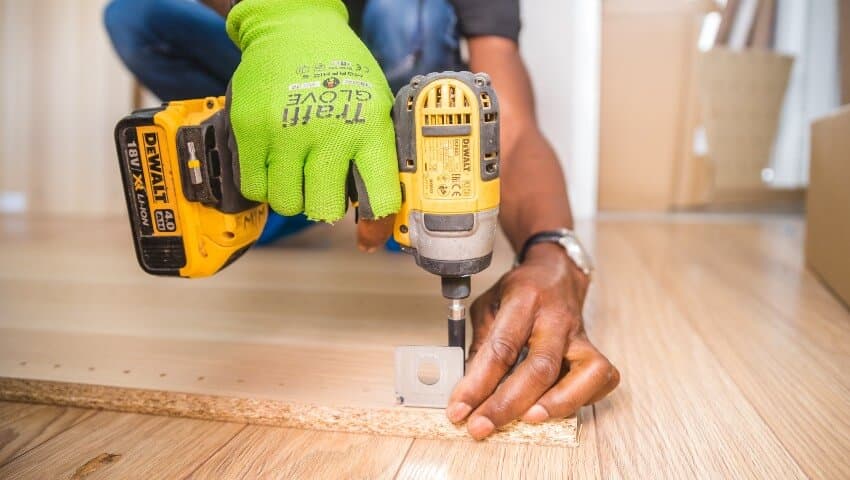What Kind of Insurance Does a Handyman Need?

Wondering what kind of policies are included in handyman insurance? Read our article to find out.
As a handyman, you’re a jack-of-all-trades, taking on a variety of projects from fixing leaky faucets to installing light fixtures. With your skills, you help homeowners and businesses keep their spaces in top shape. But as with any business, it’s important to make sure you have the right insurance coverage to protect yourself, your business, and your clients. In this article, we’ll explore the different types of insurance handymen need to ensure they’re covered for any unexpected events that may arise.
Related Read: The 3 Best Handyman Apps to Grow Your Business
Common Types of Coverages for Handyman Insurance
Handyman insurance typically comes with three main types of coverage. Let’s take a closer look at these main components of handyman insurance.
Commercial General Liability Insurance
Commercial General Liability Insurance is a crucial coverage for handymen to have since it provides protection against bodily injury, property damage, or personal and advertising injury to others. For example, if a handyman is working on a project for a customer and accidentally causes damage to their property or someone is injured as a result of their work, the customer may file a claim against the handyman.
Related Read: What Is General Liability Insurance for Contractors?
Tenants Legal Liability
Tenant’s Legal Liability coverage is another important coverage option that handymen should consider as part of their insurance policy. This policy covers loss or damage caused to rented properties that you are legally liable for. This coverage can be particularly important for handymen who offer property management services and are responsible for ensuring that tenant properties are properly maintained. Without Tenant’s Legal Liability coverage, handymen risk being held financially responsible for any tenant-caused damages, which can be costly and can compromise the success of their businesses.
Tools and Contractors’ Equipment
Handymen rely on their tools and equipment to perform their work, and any damage or loss to those items can have a devastating impact on their business operations. Tools and Contractors Equipment coverage is an insurance add-on that covers portable tools and mobile equipment while in your home, locked vehicle, or at job sites. This coverage can help handymen quickly replace or repair essential tools and equipment they need to continue working and earning an income. Without this coverage, lost or damaged tools could cause delays in projects, leading to dissatisfied customers and lost revenue. By including this coverage in their insurance policy, handymen can ensure that they can continue to operate their businesses in the event of equipment loss or damage while minimizing financial risks.
Non-Owned Automobile Liability Coverage
Non-Owned Automobile Liability coverage is a vital part of any handyman insurance policy, particularly for those who may use personal or borrowed vehicles during the course of their work. This type of coverage provides protection against bodily injury and property damage that may occur while operating a vehicle that is not owned by the handyman or their business, including vehicles rented or borrowed by the handyman or their employees. This can be crucial for handymen who frequently drive or rent vehicles for work-related travel or transport of equipment. Without this coverage, handymen risk being held personally liable for any accidents or damage they cause while using the vehicle. It’s important to note that this coverage is limited to private passenger vehicles and light commercial vehicles weighing less than 4500 kg.
Contents Coverage
Contents coverage is an important insurance policy that handymen should consider having as part of their insurance portfolio. This type of coverage provides protection for equipment, office furniture, leasehold improvements, and other items kept at the business location from unexpected loss or damage, such as fire, theft, or vandalism. Additionally, Contents coverage can include Off Premises Extensions, which provides coverage for items during transport or installation outside of the business location. This can be especially important for handymen who frequently transport equipment or work on projects off-premises. Without Contents coverage, the cost of replacing lost or damaged equipment could put a significant financial strain on a handyman’s business operations.
How Much Does Handyman Insurance Cost?
There are several factors that can impact the cost of handyman insurance, such as:
Employee count: As the number of employees increases, so do the risks and costs associated with insuring your business.
Type of projects: The risks involved in residential and commercial projects differ, and insurance costs vary accordingly.
Experience: Insurers may offer lower premiums to businesses with more experience in their field.
Business history: Insurers may assess your business’s claims history and legal troubles to gauge risk and determine coverage options.
Location: Your business’s location can affect insurance rates, depending on factors such as local regulations and crime rates.
Policy details: The coverage amount and deductible you choose when purchasing a policy can impact your premium. Higher coverage limits may result in higher premiums, while higher deductibles may result in lower premiums.
Annual revenue: Insurers may consider your company’s revenue as an indicator of its size and risk level, and adjust your insurance rate accordingly.
Related Read: How Much Is General Liability Insurance for Contractors?
How Do I Know If I Need Handyman Insurance?
If you own a handyman business, having insurance coverage is essential. It’s important to ask yourself a few questions to determine whether you need handyman insurance, such as:
Do you offer specialized services such as electrical, plumbing or carpentry work?
Do you have employees or subcontractors working for you?
Do you work with heavy equipment or in high-risk environments?
If your answer to any of these questions is yes, then you should strongly consider purchasing insurance coverage tailored to your specific needs. Even if you don’t offer specialized services or work with employees, accidents can still happen, and you’ll want to ensure your business is protected.
Related Read: Do I Need Business Insurance?
We offer business insurance that’s effortless, flexible, and affordable. Get a free quote in less than five minutes for insurance that’s tailored to your specific needs.
Looking to start your own handyman business? Read our article How to Start a Contracting Business to get started.
Originally published April 22, 2023, updated October 29, 2024
Back to APOLLO MagazineLooking for tenant insurance?
Get no-nonsense coverage that's the best value for your money. Purchase policies from your computer or phone, receive your documents instantly, and save when you buy online.
4.7 rating
Looking for tenant insurance?
Get no-nonsense coverage that's the best value for your money. Purchase policies from your computer or phone, receive your documents instantly, and save when you buy online.
4.7 rating
Relevant articles
Getting insured is as easy as 1 - 2 - 3

Tell us (very little) about yourself
Just tell us your address, your name, email and phone number. And that's it. We'll give you a price in less than a minute.

Pay online easily and securely
You can choose to pay monthly or save money by paying for the entire year in one easy payment.

Get your documents in your inbox - instantly
As soon as you complete your purchase, you'll find your proof of insurance and policy documents waiting for you in your inbox.
Get covered today - it couldn’t be easier
We’ve provided more than 1,000,000 quotes to Canadians just like you. Give it a try!



